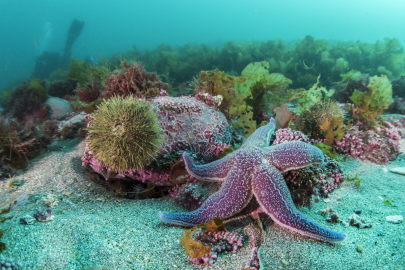National research programme Marine genomes (PEPR ATLASea)
Co-piloted by the CNRS and the CEA, the ATLASea exploratory research programme aims to sequence the genomes of 4,500 marine species in France's exclusive economic zone. Funded to the tune of €41 million over 8 years as part of France 2030, the programme will help to understand, protect and study all forms of life in all their diversity.
|
To complement the many international initiatives to sequence biodiversity, France has just given a boost to its research into marine biodiversity. France has the second largest maritime area in the world after the United States, cutting-edge research in marine biodiversity and a strong economic fabric built around the exploitation of the marine biotope. The French government has earmarked €3 billion for research in the form of ‘Priority Research Programmes and Equipment’, known as PEPRs (directed or exploratory), which form the upstream/research component of the France 2030 strategies. ATLASea is one of the winners of the exploratory PEPRs, which target emerging scientific or technological sectors for which the French government wishes to identify and structure these communities. Sequencing a genome makes it possible to retrace the evolution of biological processes, but also to learn about an individual's genetic information, to examine how their cells function and the distribution of their genes. Access to this information for a large number of species will be crucial for the future of biology. To date, 12,000 species have been identified in the exclusive economic zone of mainland France; the ambition of the programme is to sequence the genome of several thousand of them on the mainland coast and a few hundred in the overseas territories, targeting in particular species of scientific or economic interest, notably for the discovery of new bio-based antibacterial agents, or processes for the degradation of plastic by marine organisms.
ATLASea research programme: an atlas of marine genomes
Audiodescription
For more information
- Unlocking the secrets of marine genomes, article in CNRS News (10/10/2023)
-
France 2030: French government invests €41 million in a large-scale research programme to unlock the secrets of marine genomes, communiqué de presse à l'occasion de l'inauguration du PEPR (12/01/2023)
